Speakers
Share your insights, experience, and present your case. Submit your abstract and become one of the conference speaker
Share your insights, experience, and present your case. Submit your abstract and become one of the conference speaker

Dr. Abegail Tongco has been in the HR and OD practice for more than 15 years. As an HR and OD consultant and trainer; she has been exposed to companies in the banking and finance, BPO, KPO, energy, water utility, academe, food and beverage, manufacturing, construction and engineering, website and software development, architectural and engineering consulting, real estate development, mining, hospitality, printing and publishing industries. She has implemented consulting projects for GOCCs, national government agencies and local government units, as well. She is the Training and Consulting Division Director and concurrently also the VisMin Regional Director of the Profiles Group of Companies. She is currently the Board Secretary of the Board of Trustees (BOT) of the Philippine Society for Talent Development (PSTD) National as the PSTD Programs Committee Trustee-in-Charge. She is a certified Shared Leadership Coach and Team Coach, PxT, DISC and Genos EI practitioner. She is likewise a certified Kahoot content creator. She graduated with a college degree in Bachelor of Arts in Social Sciences – Psychology. She earned her graduate degrees of Masters in Business Management and PhD in Organization Development.
Executives and leaders will discuss how forming strategic partnerships and developing policy frameworks can facilitate progress toward SDGs, sharing best practices on stakeholder engagement, regulatory compliance, and performance measurement.
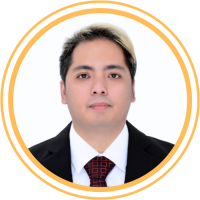
Team – oriented Professional Mechanical Engineer who works effectively with all levels of employees in cross – functional teams. With extensive experience in the Maintenance of Geothermal Steam Facility and managing complex & high value projects. Proven track record in the installation, commissioning, operation, and maintenance of mechanical equipment such as steam turbines, pressure vessels, cooling towers, pumps, fans, blowers, compressors, piping system. A Certified Maintenance and Reliability Professional (CMRP), Expert in Machinery Lubrication as 1 of only 4 certified Machinery Lubrication Engineers (MLE) in the Philippines. A certified Machine Lubricant Analyst Level 2 and a Machinery Lubrication Technician Level 1. A certified Vibration Analyst Level 2 qualified to perform basic vibration analysis. Certified by the World Partners in Asset Management (WPiAM) as a Certified Asset Management Assessor (CAMA) with in – depth knowledge and competence in asset management principles, best practices, and industry standards.
ICML 55 was developed by the International Council for Machinery Lubrication (ICML) shortly after ISO 55000 (Asset Management Standard) was introduced in 2014 to serve as the missing link between ISO 55000 generalities and the specifics of your plant’s lubrication program. This presentation will discuss what is ICML 55 and how it would help industrial plants lay out a comprehensive tactical framework to establish, implement, maintain, and improve consistent management of lubricated mechanical assets using the twelve (12) interrelated areas of a successful, sustainable lubricated asset management strategy: (1) Skills, (2) Machine, (3) Lubricant, (4) Lubrication, (5) Tools, (6) Inspection, (7) Lubricant Analysis, (8) Troubleshoot, (9) Waste, (10) Energy, (11) Reclaim, (12) Management.
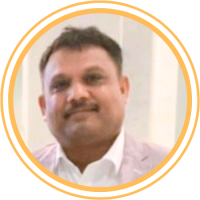
Amit Priya is the Power & OG Digital Leader for South Asia at GE Vernova. With over 20 years of experience, he is a purpose-driven, entrepreneurial strategist specializing in project and business management, as well as digital transformation. Amit has demonstrated remarkable success in driving multimillion-dollar sales growth and providing exceptional sales and project leadership in highly competitive markets. His expertise spans various sectors, underpinned by his Bachelor of Engineering in Mechanical Engineering and a Master of Business Administration (MBA). Known for his innovative approach and dynamic leadership, Amit is a highly sought-after speaker in the fields of energy and digital innovation. His deep industry knowledge and strategic insights offer invaluable perspectives on navigating and thriving in today’s fast-evolving business landscape.
Maintaining critical equipment to ensure high levels of reliability, availability, and performance is a primary focus of process engineers in every plant today. The amount of data an engineer needs to analyze effectively is growing steadily as industry incorporates digital technology. Challenging plant economics frequently dictate relentlessly increasing operational demands on ever-aging critical equipment. At the same time, staff budgets are shrinking, experienced people are retiring, and new staff need experience to maintain asset health efficiently. Maintaining efficient operation of aging assets is increasingly costly, while plant economics are challenged by budgets, experienced staff retirements, and training new staff. Technology exists to facilitate prediction of asset failure, allowing engineers to target maintenance costs more effectively. Real-time systems focused on this area of equipment-health monitoring are frequently referred to as equipment condition monitoring (ECM) or predictive asset management (PAM) systems.

A licensed engineer with a degree in Metallurgical Engineering from University of the Philippines Diliman. Currently working as a technical assistant to the Chief Engineering and Projects Officer in AboitizPower’s Thermal Business Unit. CEPO covers the following area: engineering, outage readiness, technical academy and project development and execution.
Due to its geographic nature and location in the Pacific, the Philippines has always been prone to extreme weather events such as typhoons, floodings and droughts. The projected changes in the climate only increases the likelihood of these risks. These changes are expected to have huge effect on all industrial sectors in the country, including the power sector (from fuel production up to electricity transmission.) Due to the expected long-life of energy infrastructures (> 40 years), these infrastructures are expected to go through these changes. This presentation aims to summarize the threats that comes with the changes in the climate and how it can affect the power generating assets in the Philippines.

Professional Electronics Engineer, 13+ Years Experience in Industrial Plant Engineering & Maintenance, Process Automation and Control, Maintenance and Inventory Planning using SAP PM, Preventive and Predictive Maintenance Supervisor, Project Management, Project Scoping and Execution of CAPEX Projects regarding Installation of New Production Equipment and Lines.
“Intelligent Process Cooling is the ability of a Refrigeration Plant to adjust its operation to adapt on the changes on the cooling demand. The reduction of its capacity during idle time and not go beyond what its needed, present this kind of system as energy efficient. Additionally, Adiabatic cooling towers operates less to no water consumption at all which helps to preserve our natural resources. Combination of these two leads to a sustainable future operation of Industrial Plants that has their own refrigeration system and planning to implement similar strategies. This Presentation gives an overview of an Intelligent Refrigeration Plant, describing key components and trends, application of IOT with Process Automation Control, and experiences in Project implementation and operation of this system. It aims to guide Industry Practitioners and Professionals in deciding on implementing this kind of system. Actual results such as less maintenance and operating cost, lower electricity consumption, and water conservation are the primary indicators that made this Project a success in CCBPI. “

Graduate Mechanical Engineer with over 30 years’ experience training, consulting and applying Reliability Centred Maintenance (RCM). Has worked in a large number of industries worldwide. Has also facilitated award winning projects that have delivered massive business benefit to clients
This brief presentation will cover Reliability centred Maintenance (RCM) and RCM certification. Questions addressed will include: what is RCM? How does it support sustainability? and why is certification important? Case studies will be covered explaining how RCM has improved business performance in terms of reliability, cost, environment integrity and safety. RCM can be applied to any asset or process and will be of interest to anyone with a responsibility to ensure assets or processes are reliable and cost effective
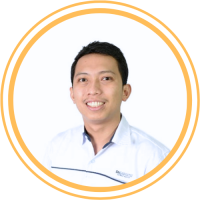
A professional Mechanical Engineer, Homer earned his bachelor’s degree in Mechanical Engineering from the University of the Philippines – Diliman. He is a graduate of the Basic Management Program of AIM. Currently the President of PSME Isabela-Quirino. Aside from his role as the Plant Manager of Magat, he also the OIC of Plant Performance, Reliability and Asset Management covering all SNAP Hydroelectric , Battery Storage, Solar and other incoming power plants.
“Beyond being a Renewable Energy company, SN Aboitiz Power (SNAP) believes that being a sustainable company means ensuring value is created and shared among its stakeholders. As of January 2024, we have three impounding hydroelectric plants (HEPs), a run-off river (ROR), a battery energy storage system (BESS), and a solar facility. The floating photovoltaic (FPV) is partially providing the energy requirements of the SNAP-Magat office and is not yet commercialized. The HEPs and BESS plants are providing services to customers and the grid. Having primarily hydro plants means production planning relies on an intricate understanding of hydrology and competency in forecasting, optimization, and risk management. SNAP implements a number of upskilling initiatives intended to enrich the organization’s existing capability and help employees acquire new skills required by the business, strategic directions, or challenges posed by digitalization and technical evolution. The company is sponsoring Lean Six Sigma (LSS) and Data Science Upskilling Programs (DSUP) to team members to further nurture the digital acumen and explore possibilities to realize the value in our day-to-day operations. Today, 28 Capstone Projects are on the pipeline and 25% of which is from the 12 Citizen Data Scientists of the Operations and Maintenance group. “

Dianne is a licensed mining engineer and a sustainability practitioner. She has more than 5 years of work experience in the field of ESG and Sustainability. She has collaborated with diverse sectors on sustainability matters, and has worked on undertaking stakeholder consultations, developing sustainability and climate goals, programs, and targets, conducting focused research on ESG & Sustainability, improving transparency on non-financial disclosures, integration of different aspects of circular economy, and EHS management systems implementation. She served as a member of the Technical Working Group in developing the national EPR Audit Guidelines. She is a Climate Reality Leader and a volunteer to several sustainability organizations like Sustainable PH and 3Zero House Philippines. She’s an advocate of circular economy, sustainable transportation, and just transition.
A discussion on implementing circular economy principles within asset-intensive industries to minimize waste, repurpose by-products, and promote resource efficiency across operations.

Engr. Dingdong has more than 2 decades of experience in the energy industry. A Certified Technical Authority (TA2) in MRTA (Maintenance Reliability and Turn Around). His subject matter expertise include Causal Learning investigations, Asset Management, Reliability/Risk based management.
This session will tackle the integration of reliability-centered maintenance within asset management to bolster industrial innovation and resilient infrastructure. It will also address the adoption of advanced predictive maintenance technologies and practices.

Donnabel Kuizon Cruz started as a technologist in Pilipinas Shell where she developed skills in process engineering, energy and profit optimization, then broadened into strategic planning, petroleum operations and safety management. She held various international assignments in Malaysia and The Netherlands where she developed a passion for developing people and
driving transformational change across multiple companies and countries. She has led teams that delivered significant value to the businesses and governments in her areas of operation, and is noted for her people-centered leadership. She is currently the CEO of Prime Energy Resources Development B.V. (“Prime Energy”), the operator of the Malampaya Deep Water Gas to Power Project under Service Contract No. 38 (“SC 38”). Prime Energy is an indirect subsidiary of Prime Infrastructure Capital Inc. (“Prime Infra”), founded by Filipino businessman Enrique K. Razon Jr., which invests in energy, water,
and waste management. Prime Energy delivers indigenous natural gas that fuels up to 20% of the Philippines’ power needs, and has remitted about 13.5 billion USD of revenues to the Philippine government since the start of its operations in 2001. “I am driven to continue Prime Energy’s mission: to provide a reliable energy source that reduces our country’s dependence on imported fuel, that protects Filipino consumers from high electricity prices, that paves the way for a transition to renewable energy sources, and that helps uplift lives. Every day I am propelled by this desire to make the country’s energy industry a force for good.”
This session dives into the pivotal role of asset management in fostering socioeconomic inclusion and gender equality. It explores how inclusive asset management practices not only reduce inequalities but also promote equal opportunities for all, with a specific focus on addressing gender disparities. By examining the intersectionality of socioeconomic factors and gender, this discussion aims to highlight the importance of inclusive strategies in driving sustainable development.

Bryan Cunanan has 22 years of work experience. First 7 years of which with the manufacturing industries namely General Milling Corporation and San Miguel Corporation having exposure on production, logistics, technical services and facilities audit, operation & maintenance & safety.
He is now with Chevron Philippines under the downstream oil & gas business unit, where he was the Maintenance & Construction Manager for 11 years taking charge of the asset optimization of Caltex retail stations. He also represented Chevron as part of the DOE Technical Working Group on the review of Philippine National Standards.
Currently, he is the Technical Manager for International Fuels and Lubricants – Philippines providing solutions to Commercial and Industrial focus segments such as powergen, marine, mining, construction, quarry, sugarmill, cement and fleet in terms of driving reliability and real-peso savings.
Bryan is a professional mechanical engineer with a masters in business administration. He is certified by the International Council for Machinery Lubrication (ICML) as Machine Lubricant Analyst level 2 and Machine Lubrication Engineer.
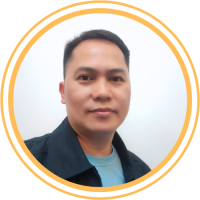
As the Maintenance Head of Ramcar Group of Companies and a certified CMRP and EnMS 50001 expert, he leverage his Mechanical Engineering degree to optimize maintenance practices. With a passion for innovation and operational excellence, he drives sustainable change and operational efficiency throughout his career.
In the rapidly evolving landscape of industrial maintenance, Artificial Intelligence (AI) stands at the forefront of revolutionizing how predictive maintenance is conceptualized and implemented. This presentation delves into the transformative role of AI in predicting equipment failures, enhancing operational efficiency, and significantly reducing unplanned downtime. Attendees will gain insights into cutting-edge AI methodologies that leverage machine learning algorithms, pattern recognition, and data analytics to forecast maintenance needs with unprecedented accuracy. The session will encompass real-world applications and case studies, demonstrating how AI-driven predictive maintenance not only ensures the optimal performance of machinery but also leads to considerable cost savings and sustainability in industries ranging from manufacturing to energy. Join us to explore how integrating AI into your maintenance strategies can unlock new levels of reliability and performance, setting a new standard for the future of industrial operations

This session explore into the transformative role of data analytics in optimizing the asset lifecycle, enhancing sustainability across critical phases from procurement to disposal. Attendees will explore how data-driven strategies can foster not just predictive maintenance and energy optimization, but also holistic sustainability in asset management. The discussion will include real-world applications of big data in improving resource allocation, extending asset life, and reducing environmental footprint through smarter decision-making.
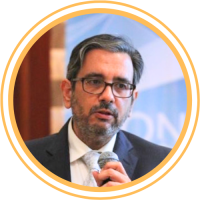
Dr. Francisco Castillo is currently Senior Vice President and Chief Information Officer of Maynilad Water Services, inc., the water concessionaire for the West area of Manila’s greater metropolitan area, which serves over 9 million people.
In 2013 he was named “Outstanding ASEAN CIO” by IDG, and in 2016 was voted Best ASEAN CIO 2016 during the ASEAN IT Strategy Forum in Singapore. He has also recently been named among the top 10 Asean CIOs by IDG this 2021, as well as Transformative CIO 2022 South-east Asia by the Economic Times CIO publication.
He is an ECE graduate from the De La Salle University, and holds a Ph.D. in Electronics and Telecommunications Engineering from the Universidad Politecnica de Cataluña (Barcelona, Spain), where he also taught as Associate Professor and was Associate Director (equivalent to Vice Dean) for the Technical Engineering College. He is also a Certified Information Systems Security Professional (CISSP), as well a certified Project and Portfolio Manager.

Engr. Glenn Pamplona is a highly skilled Rotating Equipment and Reliability Engineering Specialist with over 14 years of experience in the energy industry. Currently, he works at Prime Energy as a Rotating Equipment and Reliability Engineering Specialist. Prior to that, he held key positions at Pilipinas Shell Petroleum Corporation and SHELL Philippines Exploration B.V. His expertise includes managing and maintaining rotating equipment, leading teams, and driving improvements in equipment performance. Glenn’s strong background in mechanical, static, and rotating disciplines makes him a valuable asset in the field of Rotating Equipment and Reliability Engineering.
The objective of this workshop is to give participants an awareness of how to generate an HSSE Case, create risk assessments and generate a list of HSSE-Critical Equipment and HSSE-Critical activities, as part of operationalizing Asset Integrity in the workplace. This is an interactive session where participants will learn by working together, to generate a set of identified HSSE-Critical Equipment and HSSE-Critical Activities for their respective industries (or alternatively a a hypothetical plant) through a step by step approach using risk management concepts and tools.

* Bachelor of Science in Electronic Engineering (PRC licensed)
* 5 Years Service Engineer focusing on Plant Information Management System (PIMS) at Yokogawa Philippines
* Creator and the developer of ObX Historian, a locally developed real-time historian software that provides features for data collection, storage and visualization of any process data.
* Founder of LogX.IO Solutions Inc.
This presentation explores the revolutionary impact of machine learning on asset management. We will begin with a brief history of traditional asset management and its inherent challenges, setting the stage for the transformative power of machine learning. You will learn about key machine learning concepts and how they are applied to enhance predictive analytics, risk assessment, and portfolio optimization in asset management. Real-world case studies will illustrate successful implementations, highlighting the benefits such as improved decision-making, accuracy, and scalability. We will also address the challenges, including data quality, ethical considerations, and regulatory issues, and discuss emerging trends and future innovations. Join us to discover how machine learning is reshaping the future of asset management, offering unprecedented opportunities for efficiency and growth.
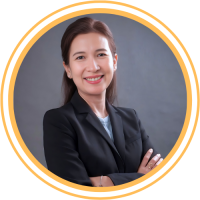
Janice Benavidez-Pamplona is a seasoned Human Resource leader with over 20 years of expertise in various areas of Human Capital Management. A trusted and innovative leader, she has a proven track record in the areas of Talent and Resourcing Strategies, Organizational Effectiveness, Diversity, Equity & Inclusion (DEI) and HR Operations, among others. Janice is currently a member of Shell’s Talent Strategy and Excellence organization as a Global Talent and DEI Excellence Advisor. In this role Janice helps shape the Group’s world-class talent management and integrating DE&I initiatives across Shell plc. With a finger on the pulse of future disruptors, the team prides in its internal and external thought leadership. In 2022, she led the production of Shell’s DEI Film Series “Unique People, Powerful Together” which has gained international recognition from New York Festival International Advertising Awards (Gold) and Cannes Corporate Media & TV Awards (Sliver). Janice started her career in Human Resources as a country HR professional in Shell Pilipinas Corporation. In her various roles spanning a decade, she has partnered with leaders in the various businesses and honed her capabilities through various business cycles and complex external landscapes. From 2013 until 2020, Janice has held various roles in Shell’s Integrated Resourcing organization expanding her scope to eventually cover the entire Southeast Asia from 2016. Concurrent to this role, she was a key member of the company’s Asia Pacific Resourcing and Asia HR Leadership Teams, where she played an active role in aligning people strategies with business ambitions delivering exceptional outcomes. Externally, Janice has been a member of the country’s National Industry-Academe Consortium as well as a Chartered Member of the Chartered Institute for Personnel and Development from 2013 to 2019.

A certified maintenance and reliability professional (CMRP) with 22 years of experience in the Petrochemical Industry. Currently, the Reliability Manager of JG Summit Olefins Corporation who leads RCA, Asset Criticality, RCM and PMO Agile Projects. Advocates learning and shares his knowledge and experience though training and consulting.
Presently, the VP- External and a member of the board of directors of AMRPP, Association of Maintenance and Reliability Practitioners of the Philippines.

A licensed mechanical engineer with a strong interest and foundation in reliability engineering, data analysis, and machine learning in detecting and diagnosing equipment potential faults. With combined 4 years of experience as a reliability engineer in the oil, petrochemical, and refrigeration industry. Currently taking graduate education in Mechanical Engineering specializing in Industrial automation, Computational Fluid Dynamics, Machine Learning, and Optimization techniques.
Condition monitoring, a critical aspect of industrial operations and an important part of predictive maintenance, involves continuous assessment of machinery and equipment to detect potential failures early. Machine learning (ML), on the other hand, is as a subset of artificial intelligence (AI), which is revolutionizing various industries by enabling systems to learn from data, identify patterns, develop inferences, and make informed decisions with minimum human intervention. The integration of ML with condition monitoring forms the backbone of predictive maintenance, a proactive approach aimed at predicting equipment failures before they occur, thereby reducing downtime and maintenance costs. This session aims to discuss the challenges and current state of this technique in the field of research, and the significant role of integrating ML with condition monitoring in enhancing predictive maintenance, laying the foundation for understanding how these concepts interrelate. Aside from exploring some practical applications of this technique across various industries, the discussion will also highlight a study that emphasizes how ML model can predict the Coefficient of Performance (COP) of similar refrigeration equipment, as a practical way to integrate ML to condition monitoring. This approach offers a reliable early warning system for potential performance degradation. The accuracy and predictive capabilities of this model underscore its value in maintaining optimal operational efficiency and minimizing unexpected downtimes. Overall, the presentation aims to demonstrate the transformative potential of ML in condition monitoring, positioning it as an indispensable component of modern predictive maintenance strategies.
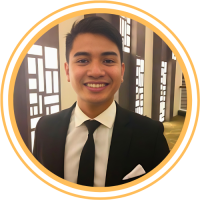
The oil and gas industry operates within an environment that deals with changes to manage threats to asset integrity, issues with ageing assets, evolving technologies, and late life asset management. In this context, the Management of Change (MOC) process plays a pivotal role in safeguarding asset integrity. This presentation aims to share the critical importance of effective change management practices in the oil and gas industry, specifically focusing on their impact on asset integrity. We will show examples of lessons learned from inadequate change management that lead to safety incidents, people consequences, asset damage, environmental harm, and financial losses. Furthermore, we would share the key elements of successful change management frameworks tailored to the unique challenges of the oil and gas industry that may be applicable to other industries.

Zen, a Petroleum Engineer with solid offshore frontline experience, currently champions business excellence in Malampaya through production and asset optimization, commercial delivery, safety leadership, and strong operational competence. Committed to improving the quality of life through sustainable energy solutions, Zen seeks to play an active role in the energy transition, leveraging expertise to drive impactful changes in the industry.

John has been with the Oil and Gas Industry for more fifteen (15) years and is currently the Reliability Manager for Petron Bataan Refinery’s Production B. His experiences cover the areas of Plant Reliability, Mechanical Inspection, Mechanical Maintenance, and Refinery Operations in the Oil and Gas Industry.
“Maintenance has been the backbone of majority if not all the industries today that provide the basic necessities, services, and requirements of the general population. Maintenance helps keep the industrial facilities and equipment up and running. Highly complex Industrial Plants and facilities in the Philippines require high reliability and availability amidst tough and challenging business environments and become better prepared to survive difficult and crippling economic challenges similar to the COVID-19 pandemic. Implementing Mechanical Integrity Programs coupled with Industrial Plant Inspection will help ensure that assets / equipment in an industrial plant will be able to provide the required performance in a safe, environmentally friendly, and reliable manner. These will help create more sustainable industrial businesses that will survive tough and difficult business environments and aid in lowering operational expenses by avoiding equipment failures and damages that may lead to unplanned plant shutdowns and unit shutdowns. The essence of the term “Mechanical Integrity” can be described in many ways and focuses more on how mechanical and structural systems are operated, inspected, tested, and maintained. This ensures that equipment are fit for service to avoid loss of containment and structural integrity. Programs developed for Mechanical Integrity help prevent incidents, maintain productivity, and maintain the economic viability of Industrial Plants and facilities. Inspection on the other hand is defined as “the practice of examining the physical condition of materials, components, or entire pieces of equipment in order to determine if and for how long it will operate as intended”. It supports the management of Process Hazards and Mechanical Integrity Programs through conduct of various inspection activities and helps assure the quality and mechanical integrity of equipment/assets during fabrication, installation, operation, and maintenance. Both Mechanical Integrity Programs and Inspection activities rely heavily on RAGAGEPs (Recognized and Generally Accepted Good Engineering Practices). These are established codes, standards, published technical reports, or recommended practices that provide guidance for activities related to engineering, operations, and maintenance. RAGAGEPs have been accepted by the consensus of industry and technical organizations. This presentation will provide more insights and more information about Mechanical Integrity and Industrial Plant Inspection that conference participants can use to develop or improve their current practices.”
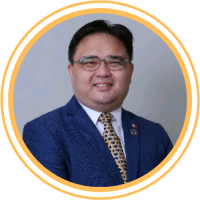
Jonas Marie Dumdum works as Industry Solutions Consulting (ISC) Senior Consultant and Lead of the NRI Manila Sustainability Service, with special focus on ESG/Sustainability Systems and Development, Climate-related Impacts to Businesses, Renewable Energy and Sustainability, Water and Wastewater Management, Overall Waste Management, and Industry-related Solutions for companies and institutions in the Philippines. He also serves as the Environment Technical Working Group Co-Lead for the Stakeholders’ Chamber for the Sustainable Development Goals by the National Economic and Development Authority (NEDA) representing the Sustainarumble! Podcast – the first podcast in the Philippines that talks about issues on sustainable development in the country. He serves as Corporate Secretary of Sustainable PH, Inc., a nongovernment organization promoting the causes of sustainability in the Philippines.
Principles linked to Environmental, Social, and Governance (ESG) are starting to cascade beyond the boardroom towards mainstream operations across all business sectors. Integrating the knowledge of environmental and social issues and technical practice in engineering can lead to resource efficiency and optimal performance while taking care of the local communities which they operate as well as nature. The impact will be felt significantly in sectors with engineering experience, particularly in areas such as construction, mining, and energy. This topic will discuss how ESG can be integrated in engineering leadership and practice and what are the best ways and examples of how companies can and have integrated ESG in their operations.
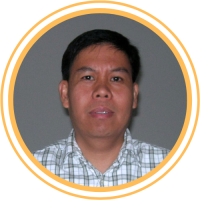
Mr. Joveth Abutas has Vibration Analyst Category II certification from Vibration Institute. He has more than 25 years of experience in vibration monitoring and diagnostics. He worked for Saudi Aramco for 16 years under the Dynamic Analysis Unit of the Consulting Services Department. He performed vibration analysis on various rotating machineries such as: motors (from 200kW to 16,405kW), fans, blowers, pumps, compressors, turbines (steam & gas) and generators. He went home for good in 2007 and worked for Bently Nevada distributors in the Philippines providing vibration analysis services including training to companies such as: Team Energy, EDC, APRI, Petron, CE Casecnan, Lafarge, Manila Water, etc. At present, he is now working for Southern Controls doing vibration analysis and conducting vibration training.
Vibration sensors such as: proximity, velocity and accelerometer are used for measuring vibration. Proper selection of these sensors for specific applications is important to obtain correct vibration readings and problem diagnosis. Proximity transducer also called Eddy current probe or non-contact displacement transducer is used for monitoring the bearing clearance usage in a journal bearing. Journal bearings such as plain or tilting pad bearings are found in medium and large rotating machinery e.g. steam-turbine-generators, hydro-generators in Power Generation plants. They are also found in steam-turbine-compressors in the Oil & Gas industry. Linearity testing of proximity transducers is important to ensure that the readings displayed in the DCS or SCADA and Vibration Monitor are accurate to avoid false alarms and trips that may result in loss of production or profit and penalties from government. Also, most plants do not check the rotor shaft material of the machine and work only on the assumption that it is 4140 steel equivalent where a standard proximity transducer is calibrated. Now-a-days, smart transducers are available that come with configuration software to compensate or program the driver for various types of rotor shaft material.
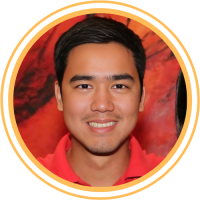
Gab is a Mechanical Engineer with over 10 years in various roles in maintenance, reliability, shutdown and project management in the oil and gas and airline industries. Currently the Senior Reliability Engineer in Prime Energy Resources Development B.V. operating the Malampaya gas field. Leads the Preventive Maintenance Optimization program as well as various problem solving initiatives to improve reliability and integrity performance.
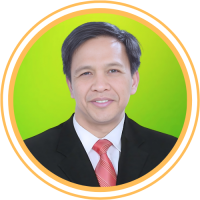
• President, Regenerative Transformation Institute
• Current Vice Chair of the Board & 2021 President, Philippine Society for Talent
Development (PSTD)
• Chair of Leadership Committee of People Management Association of the Philippines
(PMAP)
• Former OD Consulting Head, Nomura Research Institute (Manila)
• One of the Philippine’s leading voices on Regenerative Transformation and
Sustainability Culture.
• A Quality Management practitioner since 1999 and has led Quality Culture
transformation of several companies in the Philippines and in the Middle East.
• An experienced Business Strategy practitioner and facilitator having led Business
Strategy Role for an international company in the Middle East and served as strategy
consultant internally at one of the Aboitiz subsidiaries and externally as OD
Consulting Head of Nomura Research Institute (No. 1 Global Think Tank in 2019)
• 25+ years of hands-on experience in leading HR, Talent Development, OD, Corporate
Performance Management, Business Strategy and Quality Management both locally
and internationally.

Jules Oudmans is one of the co-founders of UReason, a provider of software technology products and services enabling companies to quickly create intelligent applications that automate complex reasoning on streaming data and events.
Jules has a background in AI starting in the nineties and has been involved many times in the past 25 years in prognostic and predictive programs that ensure asset integrity for critical assets and critical processes. Specialty application areas are Fault Management and Predictive Maintenance. He has set vision and supported early adaptors of A.I. and co-visionaries in Oil & Gas, Petro(chemical), Utilities, Pulp & Paper, Defence and Telecom industries at companies such as Halliburton, BP, Motorola, Siemens, Shell, Cargill, LyondellBasell and BG/Transco.
As technology has continued to evolve over the last years, so does our ability to use data to enhance operational efficiencies across various industries. Data-driven maintenance, often associated with predictive maintenance, is a cutting-edge approach that uses data analytics to optimize the maintenance of machinery and equipment. In this presentation UReason will cover the principles, benefits, methodologies, and real-world applications of data-driven maintenance and introduce the Control Valve App that delivers on the promise of data-driven maintenance, in a SaaS model, based on data you already have in your data historians.

Julie Gregorio is a Pressure Equipment Integrity Management Engineer supporting the static equipment asset integrity both onshore and offshore Malampaya. She completed her bachelor’s degree of Petroleum Engineering at Batangas State University.
“The integrity of the static equipment of the MALAMPAYA asset equipment is paramount to safety, operational efficiency, and asset integrity. This work presents the significance of maintaining and prioritizing asset integrity, the role of risk assessments, and utilization of Computerized Maintenance Management System to employ an approach to defect tagging and work prioritization. Presented as well is a strategy to identify potential vulnerabilities to take proactive measures and mitigate possible issues. The use of Integrity Management System and SAP software enhances this process by providing a comprehensive view of asset conditions, asset criticality, and facilitating data-driven decision-making. These tools are instrumental in prioritizing maintenance tasks that are critical to People, Asset, Environment, and Community. The ultimate aim is to achieve ‘goal zero’—a state of zero incidents—ensuring the safety of personnel, preserving asset integrity, and guaranteeing uninterrupted production. This is not only vital for meeting the Philippines’ energy demands but also for fostering a culture of safety and responsibility within the industry.”
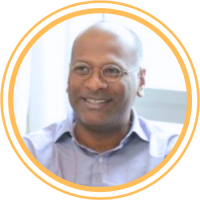
Karthik has over 20 years of experience in delivering consumer electronics and software products to market. Using a consumer first approach, Lean methodologies and Design Thinking he has helped develop value propositions, product strategy and business models that succeed in the new digital, online, and mobile economy and meet the evolving needs of a new generation of consumers. He brings a broad and deep range of business experience, gained while working with established Japanese, US and European brands and startups to help develop and launch connected, secure, scale-able products, forge successful strategic partnerships & alliances and break into new markets. He is passionate about ideas that use both embedded and cloud technology and big-picture thinking to build competitive advantage in a world of Big Data and the Internet of Things. *Authored Publication: Reshoring manufacturing to the US: The role of AI, automation and digital labor
Manufacturing leaders face the challenge of balancing productivity with sustainability amid growing environmental concerns and regulations. This presentation explores how data analytics and artificial intelligence can improve manufacturing operations for both efficiency and environmental stewardship. We’ll examine how AI-powered asset management, environmental intelligence, and resource optimization can help manufacturers reduce waste and energy consumption. The talk will provide real-world examples of data-driven decision-making to support sustainability goals in manufacturing. We’ll look at practical applications like predictive maintenance to extend asset lifecycles and resource allocation to minimize waste. Engineering leaders will gain insights on using digital technologies to work towards sustainability targets while maintaining competitiveness.”

Krisette Anne de Chavez CMRP, FS Engineer – PH&RA Kate has over 16 years experience in the oil and gas industry, research and renewable energy industry. Currently the Integrity Assurance Engineer in Prime Energy Resources Development B.V., she specializes in Asset Integrity, Reliability, Operations and Maintenance. With a degree in BS Materials Engineering, she also holds certification including Certified Maintenance and Reliability Professional (CMRP) and Functional Safety Engineer for Process Hazard and Risk Analysis.
A brief overview of the presentation to be included in the brochure and on the website (must be “print-ready” and between 100 and 200 words) * Barriers are defined as sets of controls and safeguards to prevent a major incident from happening. These can be classified as Hardware Barriers and Human Barriers. To be able to manage the Hardware Barriers effectively and assure health of these equipment, these are checked and maintained regularly by asset. This presentation introduces the concept of creating a set of hardware barriers and the applicable Performance Standard document. Discussion will also include: 1. Hardware Barrier categories in alignment with IOGP 544 2. What elements are defined in the Performance Standard document 3. How it is applied in Maintenance 4. How it contributes to the assessment of safe operation of the asset At the end of the presentation, attendees will have an overview idea on the management of Hardware barriers and assure asset integrity of the asset.

Ma. Katreena Pillejera, a licensed chemical engineer, currently serves as the Country Manager for the Philippines of the Global Reporting Initiative (GRI). Katreena has a decade of experience working with the academe, NGO, corporate top management, and government focused on sustainability program design and implementation. She has substantial experience on sustainability reporting and consulting where she lead the end-to-end development of sustainability reports across various sectors. She has technical expertise on GHG inventory and management, carbon sequestration and stock assessment, plastic neutrality and waste diversion credit mechanism development, and climate and energy studies.
Katreena is a double Master’s Degree holder, one in Energy Engineering which she earned from the University of the Philippines – Diliman, with a sandwich program in National Cheng Kung University in Taiwan; and one in Public Management from the Ateneo School of Government, showcasing her innovative study focused on climate-related loss and damage in vulnerable provinces in the Philippines. Katreena has also been active in volunteering works. She stood to be one of the Founding Board members of the Reboot Renewable Energy Transition Institute (REBoot PH) and has been its Climate and Energy Literacy Director in 2021. She is also part of the Women Energy Leaders program funded by the US Energy Association, U.S. Department of State Bureau of Energy Resources’ Power Sector Program and the U.S. Gender Equity and Equality Action Fund.
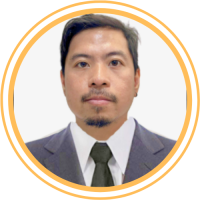
Marcos Galicia is an experienced operations manager specializing in the supervision and maintenance of service vehicles and specialized equipment at the DPWH Central Office and Unified Project Management Offices (UPMOs). With over 200 vehicles and heavy equipment under his purview, John expertly oversees a diverse team of automotive mechanics, electricians, and machinists. He excels in planning, implementing, and improving annual preventive maintenance programs to ensure the reliability and efficiency of the fleet. John is adept at generating work orders for in-house repairs and coordinating with private shops for post-inspection activities. He is responsible for evaluating and processing reimbursement documents for repair and maintenance costs across various offices. His role extends to collaborating with DPWH Regional Offices, District Engineering Offices, and Local Government Units, particularly in disaster response scenarios as part of the DPWH Central Office – BOE Quick Response Team. A key advocate for safety and health, John conducts various training programs on topics such as Basic Occupational Safety and Health (BOSH), Construction Occupational Safety and Health (COSH), and Defensive Driving. He also assesses aspiring heavy equipment operators as an HEO Assessor for the DPWH-BOE Training and Assessment Center. John’s expertise includes conducting feasibility studies, amending department orders, and mentoring OJT students.
The presentation aims to discuss the study with the end output of a Proposed New Preventive Maintenance (PM) Guide that would be used by the DPWH Central Office and its Regional and District Engineering Offices (DEOs) for the Maintenance and Management of the Government’s Land-based Fleet Nationwide. The proposed revisions in the PM Guide were derived by analyzing the failure modes and failure codes data captured over a four (4) year period, and then analyzed using a Data Analytics Software. In addition to this, also included in the study is the derivation of new PM interval checkpoints based on three (3) methods used in the Automotive Industry.
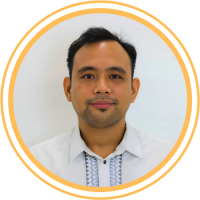
Engr. Mark Charles Tarroza, a Registered Mechanical Engineer, has been serving under DPWH – Bureau of Equipment for more than 6 years. Assigned under the Office of the Director, he was given the role of guiding the performance of the equipment life – cycle management processes under the Bureau, providing inputs, icluding points for improvement and innovation. With such, Engr. Tarroza has specialized in policy research and formulation, fleet data management and processing, and project management. His years of experience in the DPWH – BOE has provided him with familiarity on the overall processes involved, as well as the challenges present with the equipment fleet management in the public sector.
The Bureau of Equipment (BOE) is the equipment arm of the Department of Public Works and Highways, overseeing the asset life cycle management for the fleet of 7,531 land – based equipment, and 287 dredging equipment nationwide. As the fleet size is still growing, together with the scope of responsibilities, the Bureau has moved towards digitization and the application of data science to expand the productivity of its limited personnel and financial resources. The initiative resulted to a voluminous data generated daily from the fleet operation and maintenance documentations, and monitoring devices such as telematics installed with the units. The presentation explores the various applications of machine learning with fleet management in the context of a government agency, the steps taken as prerequisite for the application of machine learning with fleet management, and the current progress of BOE in the completion of its objectives. There are 2 machine learning – neural network applications that are in study, (1) the regression of parameters using multi – layer feed forward neural network, and (2) classification of dataset using autoencoders. Ultimately, the benefits of such undertaking for the organization in the long run is discussed.
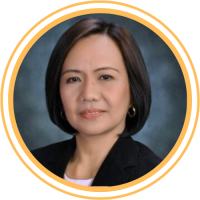
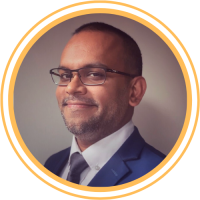
“Ir. Ts. Rafiq Khan, C. Eng is an experienced forensic investigator who specializes in Root Cause Analysis of power system equipment failures. These investigations are mainly carried out for the purpose of continuous engineering practice improvements, claims (insurance, warranty) and litigation pursuits. Over the span of the past 16 years, he has performed investigations for international clients across Europe, Middle East, Africa, and Asia. He has led and actively contributed to over 200 projects including generation, transmission and distribution network power failure investigations for primary equipment and accessories. These investigations cover various voltage classes from 0.4 up to 500 kV. He has extensive knowledge about conceptual and practical power system insulation materials, failure modes and testing methodologies related to root cause analysis of power failures. He also provides annual training on topics related to failure investigations to Transmission and Distribution Network operators around the globe. “
As the global demand for energy continues to rise, renewable energy sources such as solar power plants play a crucial role in meeting this demand. Understanding the performance metrics and factors influencing the efficiency of solar plants is essential for optimizing the operation and maximizing energy output. In this talk, the speaker delves into the intricacies of solar plant performance, focusing on two main aspects: performance metrics and factors affecting performance. The participants are introduced to the fundamental concepts of solar energy and the different types of solar power plants, emphasizing the importance of reliable performance in sustaining the growth of renewable energy infrastructure. Building upon this foundation, a range of performance metrics used to evaluate the effectiveness of solar power plants is explored, including capacity factor, performance ratio, and energy yield. Through visual examples, how these metrics provide valuable insights into plant efficiency and overall performance is illustrated. Additionally, the diverse array of factors that can influence the performance of solar plants, ranging from environmental conditions and geographical location to technological advancements and maintenance practices. By analyzing the impact of factors such as weather variability, system design, and maintenance strategies, we uncover key challenges and opportunities for enhancing solar plant performance in both existing and future installations. An overview of the importance of continuous monitoring, data analysis, and proactive maintenance in optimizing solar plant performance and ensuring long-term viability will be covered. By creating a better understanding of performance metrics and influencing factors, this talk aims to empower stakeholders within the solar industry to make informed decisions and drive innovation in the pursuit of a sustainable energy future. Join us as we explore the dynamic landscape of solar plant performance, uncovering the metrics that matter and the factors that shape the success of solar energy generation.
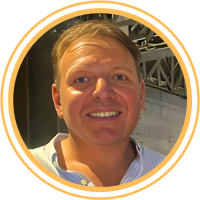
I have extensive experience as both a fleet management consultant and practicing fleet manager with a proven track record at every level of the profession, from workshop design/management to high level strategy management and software design. My knowledge has been acquired by actively working and fully understanding each role within the Fleet Management profession. I have an inherent understanding of all aspects of the business, which allows for a holistic approach to Fleet Management and a clear understanding of the impact that decisions have across the entire business.
Maintenance has been the backbone of majority if not all the industries today that provide the basic necessities, services, and requirements of the general population. Maintenance helps keep the industrial facilities and equipment up and running. Highly complex Industrial Plants and facilities in the Philippines require high reliability and availability amidst tough and challenging business environments and become better prepared to survive difficult and crippling economic challenges similar to the COVID-19 pandemic. Implementing Mechanical Integrity Programs coupled with Industrial Plant Inspection will help ensure that assets / equipment in an industrial plant will be able to provide the required performance in a safe, environmentally friendly, and reliable manner. These will help create more sustainable industrial businesses that will survive tough and difficult business environments and aid in lowering operational expenses by avoiding equipment failures and damages that may lead to unplanned plant shutdowns and unit shutdowns. The essence of the term “Mechanical Integrity” can be described in many ways and focuses more on how mechanical and structural systems are operated, inspected, tested, and maintained. This ensures that equipment are fit for service to avoid loss of containment and structural integrity. Programs developed for Mechanical Integrity help prevent incidents, maintain productivity, and maintain the economic viability of Industrial Plants and facilities. Inspection on the other hand is defined as “the practice of examining the physical condition of materials, components, or entire pieces of equipment in order to determine if and for how long it will operate as intended”. It supports the management of Process Hazards and Mechanical Integrity Programs through conduct of various inspection activities and helps assure the quality and mechanical integrity of equipment/assets during fabrication, installation, operation, and maintenance. Both Mechanical Integrity Programs and Inspection activities rely heavily on RAGAGEPs (Recognized and Generally Accepted Good Engineering Practices). These are established codes, standards, published technical reports, or recommended practices that provide guidance for activities related to engineering, operations, and maintenance. RAGAGEPs have been accepted by the consensus of industry and technical organizations. This presentation will provide more insights and more information about Mechanical Integrity and Industrial Plant Inspection that conference participants can use to develop or improve their current practices.
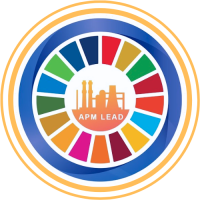
Sustainability is about lowering energy usage, lowering emissions, and changing processes to be more sustainable into the future. Many pervasive sensing solutions are already developed to help track and respond to energy waste, emissions, and the impacts of changing processes.
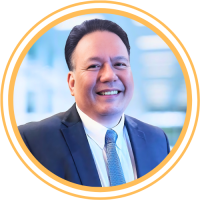
“Richard M. Caballero is a Filipino-Canadian executive with an extensive background in leading global technology companies and award-winning multinational teams in over 50+ countries and 6 continents. Born in the Philippines, he has lived and worked internationally in North America (Toronto, Canada), Asia (Hong Kong/Manila) and Europe (Germany). Richard has over 25+ years’ experience in international Sales, Marketing, Finance, Product Management and Business Development working for top global technology companies that includes Hewlett Packard, Corel, Ingram Micro, Aimetis and Digifort. As the Global VP of Sales for Aimetis, he led his team to one of Deloitte and Touche’s Top 50 fastest growing companies in Canada and Top 500 fastest growing companies in North America, leading a global sales and marketing team from Brazil, France, UK, India, UAE, Germany, China, Singapore and USA. He completed his Bachelor of Commerce at York University in Toronto and finished his MBA at the Rotman School of Management – University of Toronto, where he received the Dean’s Merit Award and Scholarship.”
“Subject Matter: Geese Mentality: Transforming Filipino Engineers to Global Leaders The Geese Project’s mission is to develop the next generation of global leaders by transitioning them from the Crab Mentality to the Geese Mentality. Based on the ground-breaking culture-based leadership approach that integrates the impact of parental upbringing, educational environment and societal norms, the Geese Project is a Filipino-centric leadership program that will transform Filipino engineers to world-class leaders by mastering the Geese Project 12 Leadership Traits. Its PCAF Quadrant model highlights which traits Filipinos are naturally good at (Power Traits), which traits Filipinos are naturally weak at (Challenge Traits), which traits Filipinos already have one key component (Aspirational Traits) and which traits are the most critical from which other traits are built on (Foundational Traits). The key to becoming a global Filipino leader is harnessing these traits. What is the “Geese Mentality”? The natural flying behaviors of the Canadian Geese serves as a powerful metaphor for effective team management and leadership, emphasizing collaboration, shared responsibility, mutual support, and the importance of positive encouragement within a group. It is only by adopting the Geese Mentality and transitioning from the traditional Crab Mentality, can Filipinos overcome the ‘leadership skills gap” and harness their full potential as world-class leaders. Target Audience: • Mid-Senior Business Leaders • Emerging Managers • Project Managers • Team Leaders Objectives: • Uncover why Filipino engineers keep hitting the “leadership ceiling” in the global stage. • Gain a deeper understanding of how culture-based leadership will transform Filipino engineers to world-class leaders. • Discover how you can break free from legacy mentality that negatively impacts your effectiveness as a Filipino leader. • Harness your strengths and weaknesses as a Filipino leader, that will enable you to effectively lead your team to peak performance. • Learn how to adopt sustainable leadership character transformation, versus short term behavior modification. The Geese Project has been presented to the Association of Filipino-Canadian Engineers (AFCE) with overwhelming positive response due to its ability to teach the “right mindset” in becoming a world-class Filipino leader. Based on an actual survey, 82% of Filipino-Canadian Engineers feel that Filipino are under represented in the Engineering and Construction industry. “The Geese Project can definitely help us change our mindset to be successful in our field of specialization.” – Dave Estrella “
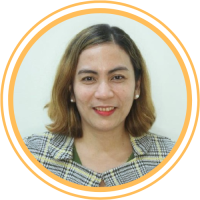
Ms. Rochelle F. Ramirez currently serves as the Assistant Director of the Systems and
Productivity Improvement Bureau (SPIB) of the Department of Budget and Management
(DBM). The SPIB is responsible for the formulation and development of policies, standards,
guidelines, and measures on management systems improvement, public sector productivity enhancement, strengthening the internal control systems of government agencies, and management of the government’s non-financial assets.
The SPIB also serves as the Secretariat of the Development Budget Coordination Committee Technical Working Group on Asset Management (DBCC TWG-AM). The TWG spearheads the implementation of the Philippine Government Asset Management Policy (PGAMP), which provides government agencies with the policies to operationalize an asset management system (AMS) to ensure the cost-effective management of assets.
Ms. Ramirez is an alumna of the University of the Philippines and the Polytechnic University of the Philippines College of Law. She has been with the DBM-SPIB for over 15 years. She began her career in the government as a Budget and Management Analyst and rose to the position of Chief of the SPIB-Asset Management Division until her recent appointment as the Assistant Director of the Bureau. She believes in serving generously and leading compassionately.

An experienced executive and mechanical engineer with extensive background in contracting, procurement, engineering and maintenance with a total experience of 23 years in the oil and gas industry. Possesses a good balance of technical and commercial management skills mainly focused on executing large maintenance activities and strategic procurement, respectively. A transformative leader who has the ability to improve struggling teams and make them successful using a combination of servant leadership and continuous improvement techniques.

Rosen is a dedicated materials science and engineering graduate with a notable publication in the Materials Science Forum in 2018. Her research focused on developing efficient yet cost-effective new materials.
With a strong passion for innovation, she transitioned to the manufacturing industry, specializing in process and technical engineering in electroplating technology. Over five years, she gained extensive experience in asset management and reliability.
Currently, in the field of asset management through oil analysis, she leverages her expertise to understand the industry’s critical parameters and needs. Her work involves the distribution of cutting-edge technologies, ensuring modern solutions are accessible to meet market demands.

Ryan is Vice President, Head of Professional Service APAC at Rizing EAM. Ryan has over 20 years’ experience in leading and delivering business & technology transformation projects in Asset Intensive Industries from both a client and delivery partner perspective. Leading the professional services team at Rizing, this has involved the implementation of multiple SAP assessment management systems across Australia, Malaysia, Philippines & Singapore. This has covered Utilities, Oil & Gas, Mining, Rail & Telecommunications. The engagements have spanned from Asset Management Assessments/Business case development through to full lifecycle end-to-end system implementation including training and change management for all users and sites. Key clients at Rizing we have helped with their asset management challenges include the Philippines (Maynilad, Manila Water, PLDT), Malaysia (Sarawak Energy), Singapore (Origin Energy) and Australia (Woodside, Sydney Trains, Endeavour Energy). A recent achievement was the successful global implementation of a greenfield asset management solution for Woodside Energy post a merger with BHP petroleum. From a client perspective, Ryan has held the positions of Delivery Executive, Program Manager & Project Director within multiple Asset Intensive firms. This has spanned implementations for ERPs for UK Rail organisations through to transformations of ERP systems for Australia based Oil & Gas and Utility organisations. Ryan’s experience and exposure with these engagements has been from guiding C-Suite Executives to develop and plan the business case for change, through to helping maintenance end users to adopt and implement the change. Ryan is actively working with clients and our consultants across our active Rizing portfolio which is delivering in Philippines, Malaysia and Australia and can be contacted at ryan.grunwadlt@rizing.com.

Experienced Chief Asset Management Officer with a proven track record in driving asset management processes in alignment with ISO 55001. Adept at providing governance and assurance monitoring, developing strategic asset management plans, and reporting on key performance indicators. Skilled in risk management, Capex investments, and effective communication of asset transitions. Holds an MBA from Henley Business School and certified as a WPiAM Asset Management Assessor. An accomplished leader with extensive expertise in power generation, performance management, and business planning. Formerly held positions as Vice President for Technical Services Coal Business Unit, General Manager (Acting) at Eskom Generation, and Chief Operating Officer (Acting) at Eskom Rotek Industries. Holds an MSc in Engineering and a Bachelor’s in Electrical Engineering.
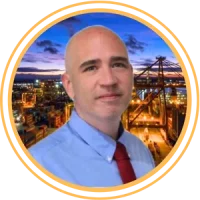
Tom Goodwin is a seasoned professional in the maritime industry, with extensive experience in port operations. His adeptness at handling pressure while prioritizing safety and cost-efficiency stems from years of practical engagement in various port environments. Tom’s proficiency in implementing new procedures and facilitating change underscores his organizational skills and adaptability. His collaborative nature fosters effective teamwork and synergy within diverse operational settings. Currently serving as the Director of Engineering at Manila International Container Terminal (MICT, ICTSI), Tom continues to leverage his expertise to drive excellence and innovation in port engineering practices. Such innovations managed are the design and start up of the fully automated container terminal in Melbourne Australia (VICT, ICTSI), the first hybrid RTG Cranes in Philippines, the most advanced and largest STS Cranes in the Philippines, as well as multiple successes in the Reliability and Asset Management fields. Tom is also helping guide and deliver positive growth and change as MICT’s Sustainability Champion.

Engineer Toribio Noel L. Ilao is an accomplished professional with expertise in physical asset management and engineering. He served as a Professional Physical Asset Management Advisor for the Department of Public Works and Highways (DPWH) for over three years before becoming the Director IV of the Bureau of Equipment (BOE) at the age of 38, the youngest ever appointed in DPWH’s history. He revamped DPWH’s fleet and facilities management program, focusing on Strategic Asset Lifecycle Management. He also improved the DPWH Dredging Operations using sound management and engineering approaches. Engineer Ilao holds a Bachelor’s degree in Mining Engineering and is pursuing a Master’s in Innovation and Management. He has undergone leadership and technical training programs at renowned institutions, including the University of Oxford and MIT. His diverse background and commitment to continuous growth make him a highly accomplished professional.

Mr. Voltaire Cruz the General Manager of Field Execution Optimization at Shell Shared Services Asia B.V., brings a wealth of expertise and leadership to the table. With a collaborative, integrative, and action-oriented mindset honed over 25 years, he’s adept at optimizing asset management strategies. Cruz is known for his unwavering commitment to safety and his track record of delivering exceptional plant reliability and availability while controlling costs effectively. His tenure at Shell Shared Services Asia B.V. underscores his dedication to driving operational excellence and efficiency in the energy sector, making him an invaluable asset to the organization.

Mechanical Engineer by Profession with more than 15-years of work experience in Maintenance and Reliability covering from Planning, Scheduling, Execution, Analyzing and Continuous Improvement.
Every industry always aims towards achieving the world-class status in Reliability. But what does it really means by world-class and reliability? and how do we achieve it, or how do we even start? In this presentation, we will be sharing our journey, our learnings and our way forward.